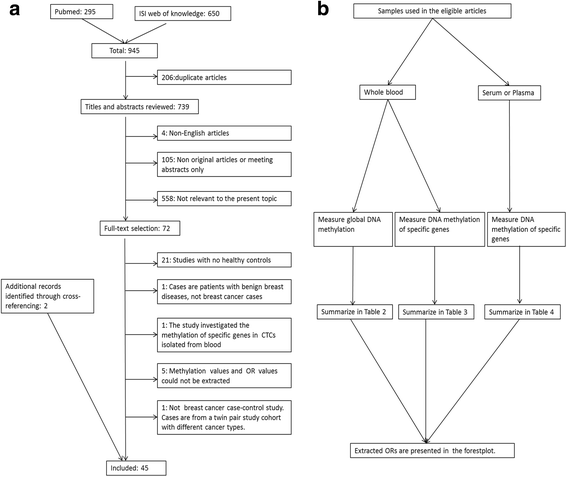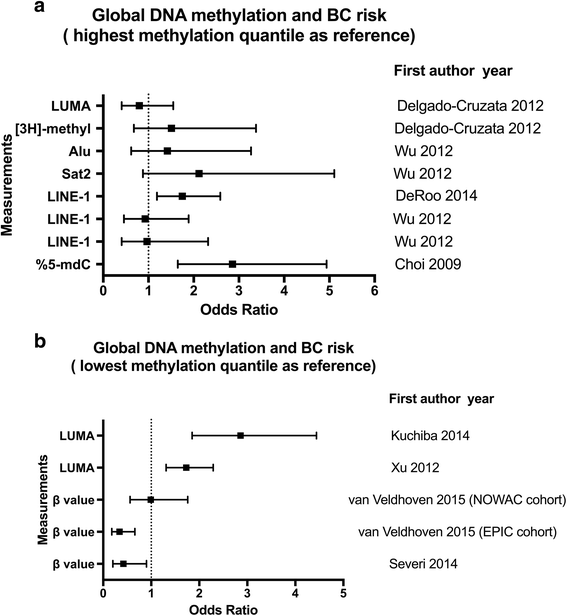Blood-based DNA methylation as biomarker for breast cancer: a systematic review
- PMID: 27895805
- PMCID: PMC5109688
- DOI: 10.1186/s13148-016-0282-6
Blood-based DNA methylation as biomarker for breast cancer: a systematic review
Abstract
Multiple studies have investigated global DNA methylation profiles and gene-specific DNA methylation in blood-based DNA to develop powerful screening markers for cancer. This systematic review summarizes the current evidence on methylation studies that investigated methylation level of blood-derived DNA of breast cancer (BC) patients in comparison to healthy controls by conducting a systematic literature review in PubMed and Web of Science. Essential results, such as methylation levels of BC cases and healthy controls, p values, and odds ratios, were extracted from these studies by two investigators independently. Overall, 45 publications met the inclusion criteria for this review. DNA from whole blood, as well as cell-free DNA (cfDNA) from serum or plasma, was used in these studies. The most common method used for measuring global DNA methylation was the investigation of repetitive elements as surrogates and the application of array-based genome-wide methylation analysis. For measuring gene-specific methylation level, methylation-specific PCR and pyrosequencing were the most frequently used methods. Epigenome-wide blood DNA hypomethylation in BC patients were reported in several studies; however, the evidence is still not conclusive. The most frequently investigated gene in whole blood was BRCA1, which was found more frequently methylated in patients compared to controls. RASSF1A was the most widely investigated gene in cfDNA of serum or plasma, which was also found more frequently methylated in patients compared to controls. Several of the eligible studies reported the associations of global hypomethylation and increased BC risk. Studies investigated associations between gene-specific methylation and BC risk, while got heterogeneous results. But two studies reported that hypermethylation of ATM gene was associated with increased BC risk, which suggest the potential use of this gene for BC risk stratification. Overall, our review suggests the possibility of using blood-based DNA methylation marker as promising marker for BC risk stratification, as several studies found associations between certain methylation level in blood and BC risk. However, so far, the evidence is still quite limited. Optimal markers are yet to be developed and promising results needed to be validated in prospective study cohorts and tested in large screening populations.
Keywords: Blood-based biomarker; Breast cancer; DNA methylation; Systematic review.
Figures



References
-
- Bast RC, Jr, Ravdin P, Hayes DF, Bates S, Fritsche H, Jr, Jessup JM, et al. 2000 update of recommendations for the use of tumor markers in breast and colorectal cancer: clinical practice guidelines of the American Society of Clinical Oncology. J Clin Oncol. 2001;19(6):1865–1878. - PubMed
Publication types
MeSH terms
Substances
LinkOut - more resources
Full Text Sources
Other Literature Sources
Medical
Research Materials
Miscellaneous

